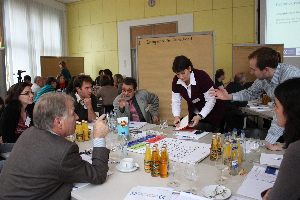Karlsruhe Institute of Technology (KIT) pleads for conveying scientific topics on a broad level. As one of the leading energy research institutions in Europe, KIT looks back on a number of activities in the Energy Science Year. For instance, KIT sup-ported the Karlsruhe Citizen Conferences on Future Energy Use. During the two conferences organized by the initiative “Wissen-schaft im Dialog” (WiD, Science in Dialog) in October and No-vember this year, the participants developed visions, from which both researchers and the citizens themselves may profit.
One of the big topics in the future will be the reliable, safe, afforda-ble, and environmentally compatible supply of humans with energy. Scientists at the KIT Energy Center develop an overall concept for the future energy mix. “To fulfill our mission in energy research for the society, we are also committed to the dialog between research and citizens,” explains the Director of the KIT Energy Center, Dr. Wolfgang Breh.
At the conferences organized by the initiative “Wissenschaft im Dia-log” and supported by the city of Karlsruhe and KIT, about 100 citi-zens discussed aspects of future energy use with each other and with experts. The conferences of two days’ duration each in October and November this year at KIT resulted in visions for energy supply and strategies to implement these visions. The Karlsruhe Citizen Conferences demonstrate that the interest of people in future-relevant topics is enormous and that they wish to be integrated in decision processes as early as possible. On November 21, after animated discussions, the participants agreed on an opinion includ-ing five visions and recommendations to science, politics, industry, and society. For example, the citizens developed the idea of an “intelligent house” and recommended to draft a new energy-efficient building legislation. Further information on the visions and recom-mendations of the citizens can be found at www.buerger-debattieren.de.
Also the energy workshop for pupils organized by WiD and KIT in early October served to convey scientific topics. “Arousing the inter-est of young people in these topics is of crucial importance,” ex-plains Wolfgang Breh. “It is them who will live in the world of tomor-row.”
Support of citizen conferences and the pupil forum was one element of the activities of KIT in the Energy Science Year. Highlights of this year were the Open Day at KIT with more than 45,000 visitors, the launch of the internet energy quiz of the Helmholtz Association, and energy exhibits at the exhibition “Entdeckungen” (discoveries) on the island of Mainau in Lake Constance and on board of the ship MS Science.
Karlsruhe Institute of Technology (KIT) is one of Europe’s leading energy research establishments. The KIT Energy Center pools fundamental research with applied research into all relevant energy sources for industry, households, services, and mobility. Holistic assessment of the energy cycle also covers conversion processes and energy efficiency. The KIT Energy Center links competences in engineering and science with know-how in economics, the humanities, and social science as well as law. The activities of the KIT Energy Center are organized in seven topics: Energy conversion, renewable energies, energy storage and distribution, efficient energy use, fusion technology, nuclear power and safety, and energy systems analysis.
Being “The Research University in the Helmholtz Association”, KIT creates and imparts knowledge for the society and the environment. It is the objective to make significant contributions to the global challenges in the fields of energy, mobility, and information. For this, about 10,000 employees cooperate in a broad range of disciplines in natural sciences, engineering sciences, economics, and the humanities and social sciences. KIT prepares its 22,800 students for responsible tasks in society, industry, and science by offering research-based study programs. Innovation efforts at KIT build a bridge between important scientific findings and their application for the benefit of society, economic prosperity, and the preservation of our natural basis of life. KIT is one of the German universities of excellence.

